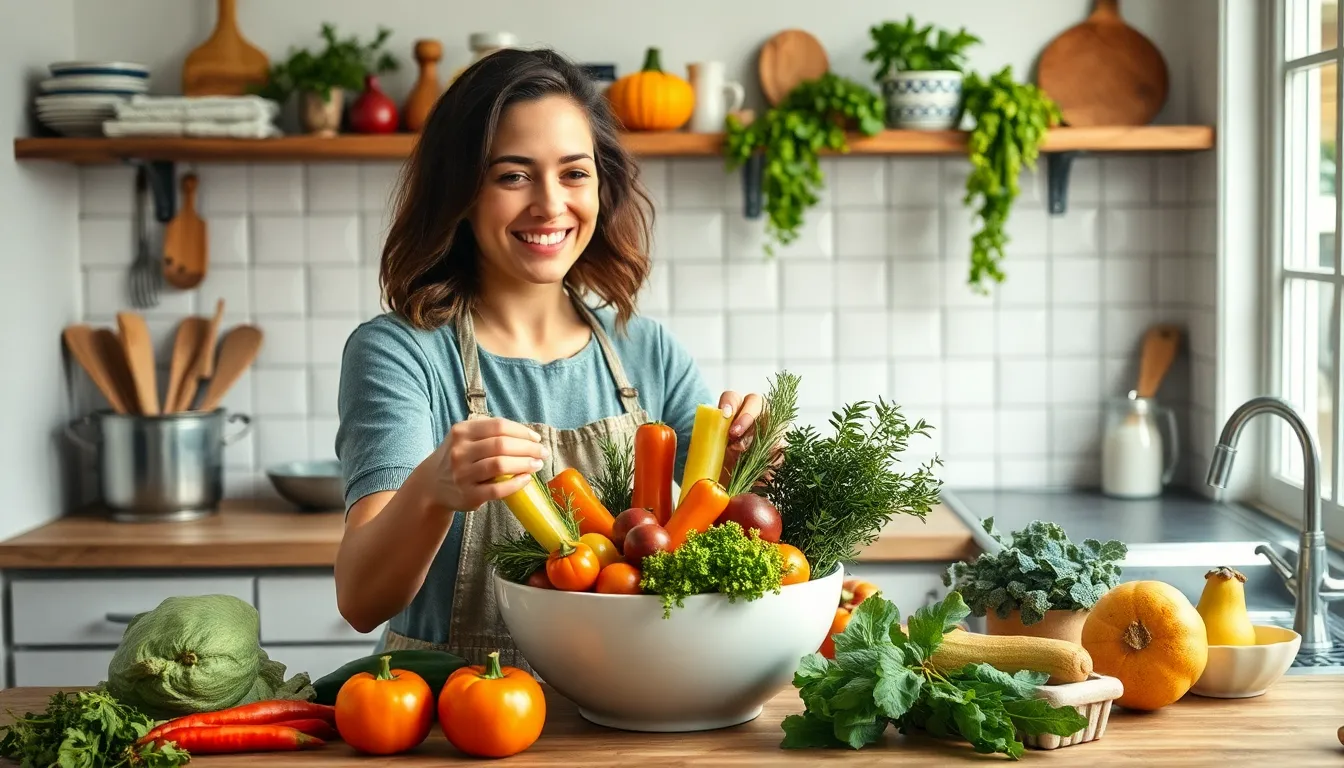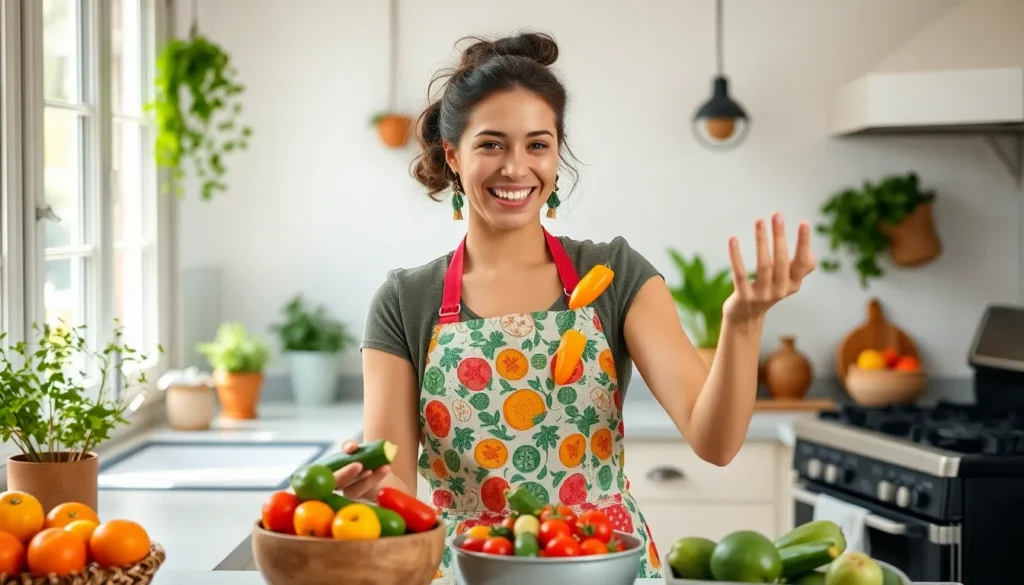Imagine stepping into the kitchen without a safety net, armed only with your instincts and a dash of creativity. Cooking without recipes isn’t just a culinary adventure; it’s a chance to unleash your inner chef and embrace the glorious chaos of flavors. Who needs precise measurements when a pinch of this and a splash of that can lead to mouthwatering masterpieces?
Table of Contents
ToggleUnderstanding Cooking Without Recipes
Cooking without recipes invites creativity and spontaneity in the kitchen. This approach allows individuals to explore flavors, textures, and techniques more intuitively.
The Philosophy Behind Intuitive Cooking
Intuitive cooking revolves around personal taste and experimentation. Emphasizing exploration, it encourages individuals to trust their instincts rather than adhere strictly to recipes. Using seasonal ingredients, she creates dishes based on available produce or pantry staples. Combining bold flavors with familiar ones sparks innovation. Embracing mistakes as learning opportunities fosters growth in culinary skills and confidence. This philosophy nurtures the joy of cooking, making it a satisfying experience.
Benefits of Cooking Without Recipes
Cooking without recipes offers numerous advantages. Freedom emerges, as it eliminates the constraints of following specific instructions. Creativity flourishes, allowing for unique recipes that reflect personal preferences. Flexibility in ingredient choices empowers cooks to adapt recipes based on what they have on hand. Time efficiency improves, as individuals navigate the kitchen with confidence, reducing prep time. Enhancing enjoyment leads to a more fulfilling cooking experience, encouraging experimentation. Overall, intuitive cooking nurtures culinary skills while fostering a deeper connection to food.
Key Techniques for Cooking Freestyle

Cooking freestyle encourages creativity and experimentation in the kitchen. Embracing this approach involves understanding some key techniques.
Flavor Pairing Principles
Understanding flavor pairings enhances culinary creativity. Familiar flavors such as salty and sweet often complement each other. Classic combinations like tomatoes and basil or lemon and garlic prove effective. Observing regional cuisines reveals extra pairing ideas, helping expand the palate. Building a mental library of flavor profiles aids in making intuitive decisions during cooking. Exploring techniques like balancing acidity with richness or heat with sweetness leads to dynamic dishes. Prioritizing freshness in ingredients ensures vibrant flavors in the final creations.
Experimenting with Ingredients
Experimentation plays a critical role in cooking without recipes. Introducing new ingredients can transform standard dishes into extraordinary meals. Trying different cooking methods like roasting, steaming, or grilling introduces diverse textures. Using seasonal produce not only supports local agriculture but also increases flavor quality. Substituting ingredients based on availability fosters resourcefulness, encouraging creative problem-solving. Tasting during the cooking process allows for adjustments, ensuring the final flavor meets expectations. Combining unexpected ingredients often results in unique and exciting outcomes.
Essential Tools for Recipe-Free Cooking
Having the right tools enhances the experience of cooking without recipes. Certain gadgets and fresh ingredients elevate intuition-driven meals.
Must-Have Kitchen Gadgets
Essential kitchen gadgets for freestyle cooking include reliable knives, non-stick pans, and measuring cups. Knives allow for easy slicing and chopping, paving the way for quick prep. Non-stick pans help achieve even cooking while minimizing cleanup. A sturdy cutting board simplifies food preparation. Tongs provide control when flipping or serving. A blender or food processor can quickly mix or puree ingredients, opening doors to creativity and experimentation. These tools not only simplify tasks but also encourage improvisation in the kitchen.
The Importance of Fresh Ingredients
Fresh ingredients significantly impact flavor and texture in spontaneous cooking. Seasonal produce typically offers the best taste, enhancing any dish prepared. Local markets often provide the freshest options, making it easier to discover unique flavors. Herbs and spices add depth, pushing the boundaries of creativity. Choosing quality ingredients contributes to the success of intuitive cooking. Fresh components inspire cooks to experiment freely, leading to exciting and delicious meals. Emphasizing freshness fosters a deeper connection with food and encourages healthier choices.
Building Confidence in Your Cooking Skills
Cultivating confidence in cooking brings freedom and creativity to meal preparation. Embracing improvisation enhances the cooking experience and helps develop unique dishes.
Overcoming the Fear of Improvisation
Fear of improvisation often holds cooks back. Trusting one’s instincts can transform the cooking experience. Starting with familiar ingredients makes it easier to experiment. Mistakes should be viewed as learning opportunities, not failures. Focusing on the joy of creating can diminish anxiety about perfection. Trying new combinations encourages culinary exploration, promoting personal taste and preferences. Engaging in small, manageable experiments builds confidence gradually.
Tips for Learning Through Practice
Practicing cooking techniques builds skill and understanding over time. Repeating simple recipes develops muscle memory and familiarity with ingredients. Experimenting with one new ingredient weekly promotes creativity. Trying different cooking methods, like roasting or grilling, expands culinary horizons. Tasting dishes throughout the cooking process allows for real-time adjustments. Inviting friends or family to cook together fosters collaboration and support. Joining cooking classes also helps sharpen skills and provides guidance.
Cooking without recipes opens up a world of culinary possibilities. It encourages individuals to explore their creativity and develop a personal style in the kitchen. By trusting their instincts and embracing experimentation, they can create dishes that are not only delicious but also unique to their tastes.
This approach fosters a deeper connection with food and enhances overall cooking skills. With the right tools and a willingness to learn from mistakes, anyone can experience the joy of freestyle cooking. As they become more confident in their abilities, the kitchen transforms into a space for innovation and self-expression. Embracing this philosophy can lead to a richer and more enjoyable cooking journey.





